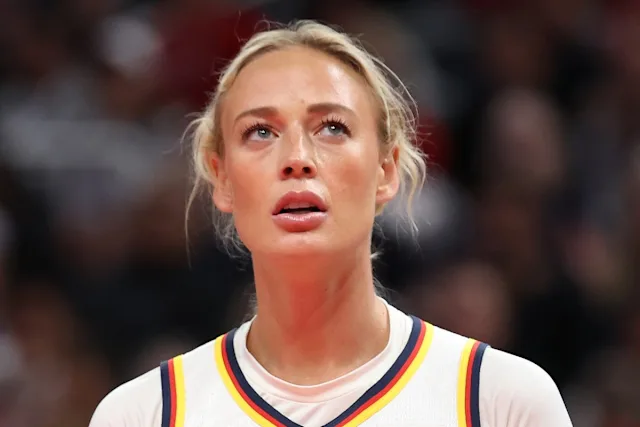In the world of professional sports, where carefully crafted press releases and media-trained athletes are the norm, raw, unfiltered honesty can be both a rarity and a revolution. Sophie Cunningham, the fiery guard for the Phoenix Mercury, has become the face of such a revolution, a lightning rod for a conversation the WNBA may not have been ready to have, but one that is now impossible to ignore. Her bold, unapologetic stance against what she perceives as systemic issues within the league has not only shaken the foundations of women’s basketball but has also ignited a passionate debate about player empowerment, transparency, and the very future of the sport. This isn’t just a story about a disgruntled player; it’s the story of an athlete who, when told to quiet down, chose instead to turn up the volume.
The saga began, as many modern conflicts do, on social media. Cunningham, never one to shy away from speaking her mind, had been using her platform to voice concerns over what she saw as inconsistent officiating, questionable scheduling, and a clear double standard in the treatment of star players. Her tweets were pointed, her critiques sharp, and they were gaining traction. The league, it seems, was not amused. Reports quickly surfaced that WNBA representatives had reached out to Cunningham, not for a dialogue, but with a directive: “tone it down.” She was allegedly asked to delete tweets, to refrain from interviews, to fall back in line. It was a pivotal moment, a crossroads where she could either acquiesce and protect her career or double down and protect her integrity. She chose the latter.
Her response was as defiant as it was public. In a move that sent shockwaves through the league, Cunningham reportedly told the officials, “you don’t own my voice,” and then, true to her word, she went live. In a passionate, unscripted broadcast to her thousands of followers, she laid it all bare. She spoke of a lack of transparency that she felt was eroding the trust between players and the league. She detailed instances of what she considered biased treatment, where certain players seemed to be officiated differently than others. She spoke of a culture where some narratives were suppressed while others were amplified, creating an environment where authentic voices were stifled. The live stream was a raw, emotional plea for fairness and accountability, and it resonated with a force the league could not have anticipated.
The fallout was immediate and widespread. The clip of her live stream was dissected, debated, and shared across every social media platform imaginable, quickly going viral. It became a trending topic, not just in the sports world, but in broader conversations about labor, free speech, and corporate control. The reaction from her peers was mixed. While some players quietly unfollowed her, a clear sign of the internal divisions her stance had created, many others, both publicly and privately, voiced their support. Messages from former players, endorsements from respected analysts, and even shout-outs from prominent NBA stars all served to amplify her message, transforming her personal grievance into a collective cause.
The situation escalated further with the leak of an alleged internal WNBA email. The timing was almost too perfect to be coincidental. Screenshots of the purported email, which predated Cunningham’s live stream, began circulating online. The email allegedly contained directives to league officials to actively avoid player controversies and to closely monitor their public statements. For many, this was the smoking gun, proof that the league was more interested in image control than in addressing the legitimate concerns of its athletes. The email, whether authentic or not, fueled the narrative that Cunningham was not just speaking out against isolated incidents, but against a calculated, top-down effort to silence dissent.
With the pressure mounting, Cunningham made a move that was both a power play and a genuine reflection of her growing disillusionment. She began to hint at the possibility of leaving the WNBA altogether. The world of international basketball has long been a lucrative option for top-tier players, and Cunningham, with her skill and newfound notoriety, was an attractive prospect. She posted a cryptic photo to her social media: her passport placed next to a basketball. The message was clear, and it was heard loud and clear. The post garnered half a million likes in less than 24 hours, a testament to the massive following she had amassed. Reports began to circulate of a staggering $1.2 million per season offer from an overseas team, a figure that dwarfs many WNBA salaries and highlights the financial leverage that elite players possess.

The WNBA, caught in a public relations firestorm, issued a brief, boilerplate statement about the importance of mutual respect and open dialogue. But for Cunningham’s supporters, it was too little, too late. The comment sections of the league’s social media pages were flooded with messages of support for Cunningham, with hashtags like “#let herspeak” and “#freeSophie” becoming rallying cries for a fanbase that felt just as unheard as the player they were championing.
What started as a series of frustrated tweets has now become a watershed moment for women’s basketball. Sophie Cunningham has transcended her role as a player to become a headline-maker, a disruptor, and a powerful voice for change. Her actions have forced the league into a difficult position, compelling it to re-evaluate its relationship with its players and its approach to transparency. Whether this will lead to meaningful reform remains to be seen, but one thing is certain: Sophie Cunningham has ensured that the conversation is happening, and she has done it on her own terms. In a world that often asks athletes to just “shut up and play,” she has reminded everyone of the immense power that comes from daring to speak up.



